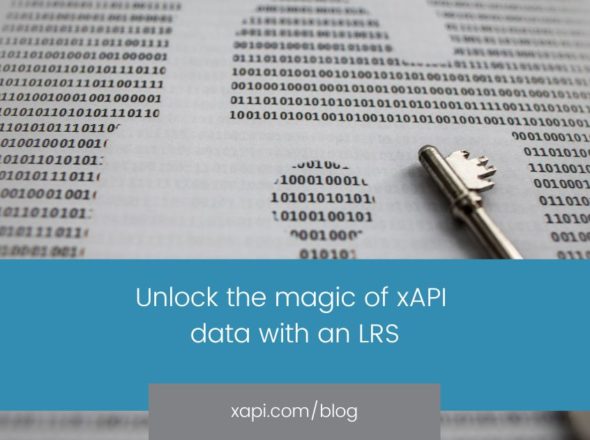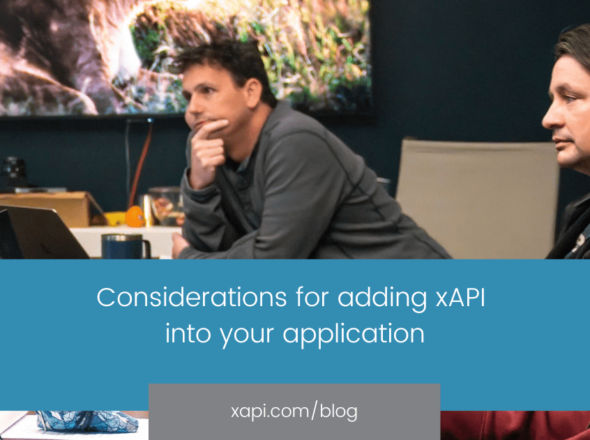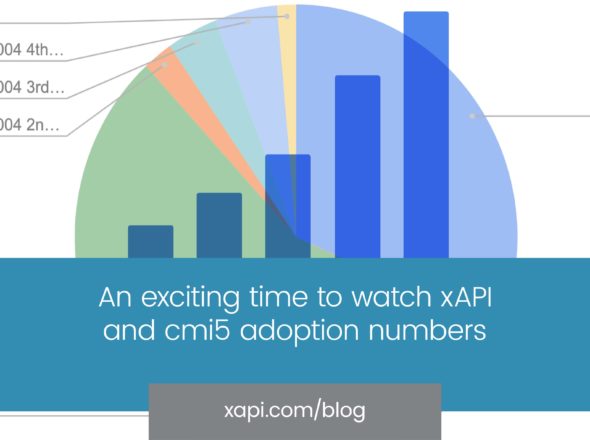Note: this is a guest blog from Ellen Meiselman, who does technical strategy and analysis for the UMHS.
I work for the University of Michigan Health System, on the Learning Management Team. We run the enterprise LMS, create online learning activities for use across UMHS, and offer innovative solutions and training for educators embedded throughout the system.
Back in 2008, I attended a SCORM 2.0 requirements gathering workshop hosted by LETSI in Pensacola. My participation was driven by the hope we could improve SCORM and maybe move it toward some of the capabilities that we particularly wanted:
- Make the LMS disappear from the user’s view where it wasn’t absolutely needed, yet track everything that needs to be tracked.
- Open up the data inside the LMS to any application that needed to consume it using standards, so this wouldn’t be a custom project for every application.
- Track and use demographic, role and other types of non-SCORM data for consumption by adaptive learning applications.
- Eliminate technical limitations of SCORM, including cross-domain issues, the requirement for an open SCORM session to be present before communication could occur, and allow third party participation in tracking for use cases like mentoring and checklist-driven demos.
Fast-forward to a few months ago, we finally got the chance to unwrap our shiny new LRS and try it out! An xAPI LRS came with the Rustici SCORM Engine we integrated with our LMS. This was very exciting for us, since we had lots of ideas that could now be tested.
Unfortunately, experimentation with new technologies is challenging in our production environment due to high-availability requirements and clinical dependencies on the LMS, so we installed the LRS in a test environment instead, and started to build prototype xAPI projects. We are currently in the process of implementing a stand-alone LRS in its own production environment, and that will enable the real pilots to begin without affecting the LMS.
Projects we are working on tend to fall into two categories: ones that involve the Learning Management System and ones that don’t. I think xAPI projects that involve integration with the LMS are only really interesting where xAPI can solve a technical problem or provide an LMS-related use-case that SCORM or AICC cannot fulfill. If it’s already working well, why fix it? Over the last few years, LMS’s have developed workarounds for some of the technical limitations of SCORM on their own, albeit in a non-standards sort of way, so the case for a LMS/LRS integration is somewhat diminished, but it is still worth doing, if only because it is a STANDARD.
However, the typical LMS is not truly an all-encompassing learning universe and there isn’t really a compelling reason to make it that. xAPI has quite a self-standing role to play. We need to bring the tracking to where people learn, not hope that people will come to where the tracking is for their not-explicitly-required learning. Truly, the use of the word “tracking” when used with xAPI is misleading – since some of the best uses for xAPI have absolutely nothing to do with tracking completions and scores.
We may want to aggregate results, but it is not clear that the LMS will be the best place to do that after a while, since its data is a subset of the kind of data that could be collected with xAPI.
The reality is that people that have a choice will never go to the LMS for all of their learning, and especially not their “real” learning, no matter what LMS vendors would like us to believe, and despite vendor attempts at providing social learning and communities within Learning Management Systems. But there are plenty of reasons for exposing, analyzing, or otherwise “tracking” some of that currently invisible learning in ways that don’t involve the LMS at all.
In case anyone is interested in getting our code, or taking projects further than we are able to at the moment, some of the projects our team has worked on are listed below.
LMS-based or LMS-tracked learning
Convert some existing SCORM activities for use with LMS
Goal: convert at least some of our existing SCORM activities and have them track in our current LMS. This will enable us to judge the effort and results of converting most of them to use with a new cloud-hosted LMS, and also whether we have more control over the reliability of scoring and status.
Scope: activities would be known to the LMS beforehand (imported into LMS)
Activities are on our LMS-domain-based webserver
User would enroll through the LMS or be batch enrolled, or deep link enrolled
Status: tracking of completions in the LMS is working. Conversion of some existing activities is in progress.
Not LMS-related
.NET Statement Generator to use as back-end
Goal: Develop a foundation piece for other projects: a statement generator that responds to inputs from other applications to construct statements as needed. This would be based on the example written in PHP by Andrew Downes, but in .NET to better fit our Windows server environment, and customized to suit the other projects we are building.
Scope: Simple statements only – no attachments, state data, etc.
Status: Finished first version – will make it available shortly
Mobile learning
Goal: Get mobile activities working more reliably with or without LMS interaction
Scope: Web-based, HTML5 responsive activities that are not necessarily known to LMS beforehand, but would show at least a completion event in the user’s LMS transcript and perhaps in another LRS-based transcript app, as yet unscoped. I’m developing a one-page wrapper that will load content from existing modules, and redirect to remote quizzes when needed, aggregating all interactions and scores, and translating the activity into xAPI statements.
Status: in Progress. Will be open-sourced when ready.
Reduce SME pain of developing simple content
Goal: Make it drop dead easy AND free for SME’s to create simple activities – no training needed.
Scope: TBD. Based on WordPress with Gravityforms quizzes, tracked using Grassblade plugin
Status: In testing and polishing phase: Proof of concept WordPress site is up and running. The main issue now is to organize the content in a way that makes sense to the main users who will be Nurses, and to organize a pilot once our LRS is ready.
-
- Read more about this project: http://thedesignspace.net/MT2archives/001028.html#.Ud2vluDCA2c
- Purchase GrassBlade Plugins from http://www.nextsoftwaresolutions.com/grassblade-xapi-companion/
- Gravity forms can be purchased at http://www.gravityforms.com/
Bite-sized-learning pilot
Goal: Replace or augment mandatories (mandatories are required learning sent out yearly by the LMS) with emailed quiz question. A single scenario-based question is answered right in the email. One per week. Users are required to complete 20-30 of 52 quizzes sent out per year. Some sort of alternative or catch-up quiz would be provided if they missed too many.
Scope: TBD. Need to resolve security issues and what happens if people forward their quizzes to their secretaries to do, etc.
Reviewer feedback & suggestions:
-
- Maybe just run it a couple months before the Joint Commission auditors show up: it would help us collect information to look for problem areas
- Could be used to test readiness, or raise people’s awareness of topics and initiatives
- Requires good reporting and analytics
Status: Proof of concept developed using an integration with MailChimp and our back-end statement generator. Look for a detailed description coming soon.
Developing this further may require developing an email quiz management application or workflow. Emailed HTML is different than web-based HTML in that nearly all the interactivity we expect is shut off for security reasons in mail clients. The only reliable type of interaction in an email is a link, and of course, once you click a link you are off the email and onto the web browser.
The goal of this is speed and one-click painlessness for the user, so one question per email may be sufficient, but if more than one question per scenario is needed, it makes more sense to merely display the scenario and question text but then link to a duplicate on the web which contains the real quiz.
Mentoring Project
Goal: create a way to track mentoring and coaching experiences, and incentivise them as well. (See Andrew Downes’ description of cascade of learning for reference.)
Scope: TBD – see diagram below.

Notes:
- We have done a small proof of concept for discussion which is a “real-life” tab for the bookmarklet that we are using. We want to be able to pull Competencies from the LMS to assign as tags or contexts for these statements.
- Existing apps might be leveraged for at least part of this workflow
Reporting and transcript management
Goal: Create a personal LRS transcript dashboard app to let users view, sort, share or move their own records around
Scope: Prototype an HTML5 responsive app that groups activities in some meaningful way and allows the user to check their scores and statements, allow access to manager or advisors to specific records or share them to another LRS. Need more input on what is meaningful here.
Status: Not started.
Informal Learning: QR-code-based scavenger hunts and just-in-time learning
Goal: pilot a device-based game where QR codes, or augmented reality locations are used to signal a “find” of a required object. Some units run scavenger hunts for their new hires.
Example: Learners are provided an unmarked map and a list. They have to locate oxy turnoffs, stairwells for evac, fire extinguishers, etc. There would be an RFI tag or QR code on the object which would be scanned by the device. Statements could feed a scoreboard.
2nd Goal: pilot the use of QR codes to provide a choice of audio or written Just-in-Time instructions on medical and other devices throughout the health system. Use analytics to decide which are most needed, most used, what impact they have, etc.
Status: under discussion for scoping. We are currently building a QR code-based statement sender as an initial proof of concept.
Checklists
Goal: Provide easy-to-use, iPad-based checklists for Nursing or Respiratory therapy. Nurses/RT’s perform demos which are assessed by a preceptor. Checklists should be easy to create and associate with one or more learners. Need a secure way to have multiple preceptors able to select a learners name and check off what they did.
Scope: TBD
Note: similar functionality may be provided by a new LMS so this is on hold, pending scoping.
User-tracked learning
Goal: allow UMHS content publishers to easily embed “Track me now” widgets in their websites, and provide bookmarklets that users can add to their favorites that authenticate and track whatever they want to save, whether web-based or in real life, with a context.Eventually this will allow users to select the competencies from their profile in the LMS as contexts.
Status: Started
Tracking for “Heart-sounds Challenge” app for Med students
Treasure-hunt iPad game framework
Goal: create a flexible easily adapted game framework that asks users to find or piece together items within some medical context. For example, find 6 selected items within a crash cart, or find hidden weapons in a psych patient’s room. Possibly add timer, click into place module for assembling equipment from pieces, etc. Track everything, of course.Add item-list generator to take care of building the arrays needed to run the game.
Status: Started. This will be opensourced when ready.
Read more about this project here http://thedesignspace.net/MT2archives/001031.html#.Ud2xDuDCA2c
Who we are:
Robert Taylor, our LMS consultant/developer has designed and developed the server-side piece of the LMS/LRS integration and upgrades as new versions of the spec came along, all the .NET pieces and has provided extremely valuable insight on all sorts of technical issues.
I am Ellen Meiselman, and I’ve done the planning, evangelizing, the design client-side scripting, and the rest of the development and testing for the projects listed.


